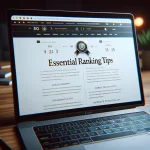Table of Contents

Key Takeaways
- Local link-building is a powerful tool to enhance your online presence and attract more customers.
- Ensuring your business’s name, address, and phone number (NAP) are consistent across the web is critical for local SEO.
- Claiming and optimizing your Google My Business listing is a must-do first step.
- Submitting your business to local directories can give you a credibility boost.
- Engaging with your local community through events and partnerships can lead to valuable backlinks.
Unlocking Local SEO Potential
Before we dive into the nitty-gritty of local link building, let’s get one thing straight: local SEO is your best friend. It’s the key to appearing in searches when potential customers are looking for businesses like yours in their area. And the cornerstone of local SEO? You guessed it—local backlinks. These are links from other websites in your area that direct people to your site. They’re like votes of confidence, telling search engines that your business is a trusted resource.
Why Local Backlinks Matter
Local backlinks do more than just boost your search engine rankings; they drive local traffic to your site and help establish your business as an authority in your community. Think about it: when a local news outlet or a well-known community blogger links to your site, they’re not just giving you a backlink—they’re endorsing you to their readers.
The Impact of NAP Consistency
One of the simplest yet most crucial steps in local link building is ensuring your business’s NAP (Name, Address, and Phone number) is consistent everywhere it appears online. Why does this matter? Because search engines are smart, but they can get confused by discrepancies. If your NAP is inconsistent, search engines might not recognize that all those mentions are indeed your business, which can hurt your local search rankings.
The Foundation of Local SEO Link Building
Now, let’s lay the groundwork. To start building local links, you need a solid foundation, and that begins with your Google My Business listing. This free listing is your business’s profile on Google, and it’s the first thing many customers will see. So, let’s make sure it shines.
Google My Business Optimisation
First things first, claim your listing. Once that’s done, fill in every detail: your accurate NAP, business hours, description, and don’t forget to add high-quality photos. Regularly updating your listing with fresh content, like posts about promotions or events, signals to Google that your business is active and engaged. Learn more about Google My Business mastery to enhance your local search presence.
Local Business Directory Submissions
Besides Google My Business, there are plenty of other directories where your business should be listed. Think of sites like Yelp, TripAdvisor, or even local Chamber of Commerce websites. When you list your business on these sites, ensure your information is consistent with your Google My Business profile to avoid any NAP confusion.
Remember, local link building isn’t a one-and-done deal. It’s an ongoing process that requires attention and nurturing. But with each step, you’re paving the way for your business to be more visible and more accessible to the local community—and that’s where your future customers are.
Leveraging Local Influencers and Bloggers
It’s all about who you know, right? In the digital world, that means getting in touch with local influencers and bloggers. These are the folks who have the power to share your business with their followers. But how do you get them to notice you? It’s simpler than you think. Start by making a list of local influencers whose audience matches your target customers. Then, reach out with a personalized message. Maybe you can offer them a free trial or a behind-the-scenes look at your business.
But remember, it’s not just about what they can do for you. Influencers want to share content that’s valuable to their audience. So, think about what you can offer that’s truly engaging. That might be a unique story about your business, a special event, or even just your amazing products or services.
Here’s a real-life example: a local bakery once partnered with a food blogger for a ‘bake-off’ event. The blogger shared the event with her followers, who then linked to the bakery’s website for details. This not only drove traffic to the bakery’s site but also created a buzz around the brand.
Monitoring and Managing Your Local Link Profile
Once you start building local links, it’s important to keep an eye on them. You want to know which links are helping you and which ones might be hurting your SEO efforts. That’s where link tracking and backlink analysis come in. They help you understand the value each link brings to your business.
But how do you track all these links? There are tools out there designed just for this purpose. They let you see where your backlinks are coming from, the quality of these links, and how they’re affecting your search engine rankings. Some of these tools even alert you when you gain or lose a link, so you can stay on top of your link profile in real time.
Tools for Link Tracking and Backlink Analysis
There are several tools available for link tracking and analysis. Some of the most popular include Ahrefs, SEMrush, and Moz’s Link Explorer. These tools can show you not just who’s linking to you but also how strong those links are. They’ll give you insights into which of your pages are most popular with other sites and where there might be opportunities to get more links.
Strategies for Competitor Backlink Replication
“Don’t reinvent the wheel. If your competitors are ranking higher than you, it’s worth taking a look at who’s linking to them and why.” – Local SEO Expert
Competitor backlink replication is about learning from the best. By analyzing your competitor’s backlinks, you can figure out which local sites are giving them that SEO edge. Then, you can target those same sites for your link building. It’s not about copying exactly what your competitors are doing, but rather understanding what’s working for them and adapting it to fit your unique business.
Optimising Local Content for Backlink Attraction
Content is king, even in local SEO. If you want local sites to link to you, you’ve got to give them something worth linking to. That means creating content that’s not only interesting and useful but also relevant to your local area.
- Write blog posts about local events or issues.
- Create guides or resources that are specific to your location.
- Share success stories or case studies from local customers.
When you create content that resonates with your local audience, other local sites are more likely to share it. And that means more local backlinks for you.
Creating Share-Worthy Local Content
So, what makes content share-worthy? It’s all about the value it provides. If you can solve a problem, entertain, or inform, you’re on the right track. For example, a local hardware store might create a video series on home improvement projects tailored to their city’s unique climate challenges. That’s the kind of content that local homeowners—and local websites—will want to share.
Local Keywords and Content Relevance
Using local keywords is like planting a flag in your digital territory. It tells search engines and users exactly where you’re located and what you offer. So, make sure you’re sprinkling these local terms throughout your content. But be careful not to overdo it. Your content should still read naturally. Think about the terms people in your area might use when searching for your products or services, and use those in your content.
For instance, if you run a coffee shop in Portland, you’ll want to include phrases like “Portland coffee shop” or “best espresso in Portland” in your content. That way, when someone in your city is looking for a caffeine fix, your business pops up.
| Strategy | Benefits |
|---|---|
| Claim and optimise your Google Business Profile | Ensures your business information is accurate and up-to-date on the most important local search platform |
| Build citations on local directories and niche sites | Increases your online visibility and helps search engines verify your business details across the web |
| Utilize data aggregators to distribute your business info | Efficiently spreads your NAP (name, address, phone) data to a wide network of directories and platforms |
| Monitor and maintain citation consistency | Prevents inaccuracies that can hurt your local search rankings and credibility with customers |
| Focus on high-quality, relevant citations | Provides more value than simply building a high volume of low-quality citations |
| Automate and streamline citation building | Saves time while ensuring comprehensive coverage of important local listing |
| Analyse citation performance and gaps | Identifies opportunities to improve your local search visibility and address any missing or incorrect listings |
| Create social media profiles and leverage them | Social media sites provide high-authority backlinks and help validate your business information |
| Find sponsorship opportunities with local entities | Earns backlinks while also increasing your business’s visibility in the community |
| Reach out to local bloggers and influencers | Can lead to featured content and backlinks from relevant local sources |
| Monitor competitors’ backlinks for opportunities | Helps you identify and capitalise on local link building gaps |
| Participate in or host community events | Builds relationships and earns local media coverage and backlinks |
| Leverage local business and industry associations | Provides access to relevant, high-authority backlink opportunities |
| Pitch stories to local news publications | Earning media coverage can result in valuable .edu, .org, and .gov backlinks |
Maximizing Visibility Through Local Reviews and Testimonials
Reviews and testimonials are gold in the world of local SEO. They not only provide social proof to potential customers but also signal to search engines that your business is legitimate and trusted. Encouraging your customers to leave reviews can lead to a stronger online presence and, you guessed it, more local backlinks.
Encouraging Customer Reviews
Getting reviews might seem daunting, but it’s really about making it easy and appealing for customers to share their experiences. You can do this by sending follow-up emails after a purchase, offering incentives for leaving a review, or simply asking customers in person when they visit your business.
Just be sure to respond to reviews—both good and bad. This shows that you value customer feedback and are actively managing your online reputation.
Utilizing Testimonials for Local Credibility
Testimonials are another great way to build trust and attract local links. Featuring customer testimonials on your website can encourage other local sites to reference your business as a credible source. It’s also a good idea to share these testimonials on your social media channels, where local influencers and bloggers can easily find and share them.
By following these strategies, you’ll be well on your way to building a robust local link profile that can elevate your business’s online visibility and authority. Remember, local link building is a marathon, not a sprint. It takes time and effort, but the rewards are well worth it.
Now, let’s talk about the true heart of local SEO: your content. It’s the meat and potatoes of your website, and it’s what draws people in and keeps them coming back for more. But when it comes to local link building, your content needs to do more than just inform—it needs to connect with your local audience on a deeper level.
That means creating content that’s not only informative but also engaging and relevant to the local scene. It’s about tapping into the interests and needs of your community. Whether it’s a blog post about a local event, a guide on the best local eateries, or a feature on a community project, your content should resonate with the people in your area.
Creating Share-Worthy Local Content
Creating content that’s worth sharing is key to getting those valuable local backlinks. Think about what makes your area unique and what local residents are passionate about. Is there a local festival coming up? Write a preview article. Did a new park just open? Put together a guide on the best activities to do there. When your content is share-worthy, local websites, forums, and social media groups are more likely to link back to it.
Local Keywords and Content Relevance
Incorporating local keywords into your content is crucial. They’re the signposts that tell search engines—and users—what your content is about and where it’s relevant. But remember, the key is to use these keywords naturally. Stuffing your content with too many keywords will not only turn off readers but can also penalize you in search rankings.
Let’s say you run an artisanal cheese shop in Madison, Wisconsin. You’ll want to include phrases like “Madison cheese shop” or “best artisanal cheese in Madison” in your content. This way, when someone in Madison is looking for a new cheese experience, your shop comes up front and centre in their search results.
Maximizing Visibility Through Local Reviews and Testimonials
Reviews and testimonials are powerful tools that can dramatically enhance your business’s online visibility. They provide social proof, which not only influences potential customers but also improves your search engine rankings. Positive reviews can lead to more local backlinks as other websites and users begin to see your business as a credible and authoritative source in the area.
Encouraging Customer Reviews
Encouraging customers to leave reviews isn’t rocket science, but it does require a proactive approach. Make it easy for them: send a friendly email after a purchase, offer a small discount on their next visit for a review, or simply ask them in person if they enjoyed their experience. And remember, when customers do leave reviews, always respond with gratitude or a thoughtful reply. It shows that you’re not just listening but that you care about their feedback.
Utilizing Testimonials for Local Credibility
Testimonials are like the highlight reel of your customer’s experiences. Featuring them prominently on your website can serve as a beacon for local backlinks. When other local businesses, bloggers, or customers see these testimonials, they’re more likely to reference your business and potentially link back to your site. Sharing testimonials on social media can also increase their visibility and shareability, leading to more local engagement and links.
By implementing these local link-building strategies, you’re setting your business up for success. It’s about building a network of digital pathways that lead straight to your website, enhancing your local search rankings, and establishing your business as a community staple. Keep at it, and soon you’ll see the fruits of your labour—a thriving business with a robust online presence.
Measuring the Success of Your Local Link-Building Efforts
So, you’ve put in the work, but how do you know it’s paying off? That’s where measuring the success of your local link-building efforts comes into play. You’ll want to keep an eye on key performance indicators (KPIs) like your search engine rankings, the number of backlinks, and the quality of those links. These metrics will give you a clear picture of how your local SEO is impacting your business’s online visibility.
Key Performance Indicators (KPIs) for Local SEO
When it comes to KPIs for local SEO, here’s what you should be tracking:
- Local search engine rankings for relevant keywords.
- The number and quality of backlinks pointing to your website.
- Website traffic from local sources.
- Conversion rates from local visitors.
- Online mentions of your business’s NAP.
Adjusting Strategies Based on Analytics Data
As you gather data on your local SEO performance, you’ll likely find areas that need improvement. That’s a good thing! It means you have the opportunity to adjust your strategies for even better results. Maybe you need to create more localized content, or perhaps you need to reach out to more local influencers. Use the data to guide your efforts, and you’ll continue to improve your local online visibility.
FAQs
What is local SEO and why is it important?
Local SEO is the practice of optimizing your online presence to attract more business from relevant local searches. It’s important because it helps your business show up in search results when potential customers are looking for products or services in your area, leading to increased visibility and more foot traffic.
How do backlinks affect my local search rankings?
Backlinks act as endorsements from other websites, telling search engines that your content is valuable and relevant. For local SEO, backlinks from reputable local sources can significantly improve your search rankings, making it easier for customers in your area to find you.
Are directory submissions still relevant for local SEO?
Yes, directory submissions are still a valuable part of local SEO. Being listed in local business directories helps improve your online visibility and can provide reputable backlinks to your website. Just make sure your business’s information is accurate and consistent across all directories.
How can I encourage customers to leave reviews?
Encouraging customers to leave reviews can be as simple as asking them directly after a positive experience. You can also offer incentives, like discounts on future purchases, or make the process easier by providing direct links to your review profiles in follow-up emails or on receipts.
Can local link building improve my business’s online visibility?
Definitely! Local link building can significantly enhance your business’s online visibility. By increasing the number of high-quality local backlinks to your website, you can improve your search engine rankings, attract more local customers, and establish your business as an authority in your community.
- Best UK Accountants for Doctors, Specialist Services & Advice – 4 September 2024
- Law Firm Local SEO: Strategies & Guidance for Legal Practice Ranking – 3 June 2024
- WordPress SEO Guide: Top Blogger Tips & Essential Ranking Strategies – 13 April 2024






